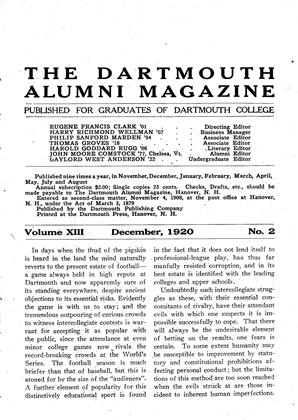Five or six years ago Luther B. Anthony, editor of The Dramatist, wrote "College men are taking practical steps in this great art (dramatics) and Dartmouth is way up in the front of the procession." What Mr. Anthony said then is still applicable. Dartmouth is way up at the front of the procession and every day Dartmouth dramatics grow stronger.
When in February, 1914, a caste of local players journeyed to New York City and presented "The Misleading Lady" at the Fulton Theatre, the Dartmouth Dramatic Association wis still in its infancy, but it was a very precocious child. Owing to the direction of Walter F. Wanger '15, the Association was able to take a leading part on the stage of undergraduate life. What Percy MacKaye called "football, sport-mad Dartmouth . . "served as a cradle for serious drama." Not only were Dartmouth teams advertising the College, but the undergraduate actors were attracting much favorable and very complimentary attention from the outside world.
In the midst of all this the war came on with the consequent demoralization of undergraduate activities in all of the colleges throughout the country. Yet even during this critical period the Dartmouth Dramatic Association was active, naturally not as active as it would have been under normal conditions, yet still occupying its place in the college circle. At the end of this period "Heave To," an undergraduate musical comedy, containing some of the most successful music yet played in Webster, was brought out.
Immediately after the war and the return of the College to a peace-time footing, dramatics were revived with renewed vigor and resulted an another musical comedy, "Oh, Doctor!", which after an overwhelming success at Prom went on the road for two performances. Again last year the same play was presented three or four times near Boston.
With such a history, The Dartmouth Players, as they are now known, started out this fall on a new year. The Dartmouth Dramatic Association as it had existed for a few years before was a thing of the past;-The Players had taken their place. While still under the jurisdiction of the non-athletic council, the acting and producing staff of the new organization was an independent group.
Immediately at the beginning of the year, The Players announced an extremely ambitious program of a play a month, plays of all types, not only the light, but also the serious. Nor was that all. Two weeks later they announced that they had made arrangements to have the Boston English Opera Company come to Hanover to present Gilbert and Sullivan's "Ruddigore."
Such action on the part of The Players deserves nothing but the highest commendation. It promises to Hanover audiences the very best in the line of theatricals. Were these monthly plays to be of a second-rate nature it would be better to have fewer but of better calibre. But when The Players present Veiller's "The Thirteenth Chair," one of the most successful detective plays ever written, Sheridan's "The Rivals," and Shaw's "Androcles and the Lion," there can be no criticism of the quality.
Nor is commendation to be confined alone to the presentations of The Players themselves. So enthusiastically was the opera company received in Hanover that the visiting actors declared that they had never before played to a more appreciative audience. More than that cannot be said to express the approbation with which the plans of The Players have been received.
When George M. Cohan permitted the Dartmouth actors to present for its initial performance one of his new one-act plays, "The Farrell Case," he showed the esteem and respect in which The Dartmouth Players are held. The war is over now and Dartmouth dramatics have gained all of their former prestige and are now operating on a still higher level than before.
 View Full Issue
View Full Issue
More From This Issue
-
 Article
ArticleTHADDEUS STEVENS
December 1920 By FRED LEWIS PATTEE '88 -
 Article
ArticlePEN AND CAMERA SKETCHES OF HANOVER AND THE COLLEGE BEFORE THE CENTENNIAL
December 1920 By EDWIN J. BARTLETT '72 -
 Article
ArticleFOOTBALL
December 1920 -
 Article
ArticleIn days when the thud of the pigskin
December 1920 -
 Class Notes
Class NotesCLASS OF 1912
December 1920 By Conrad E. Snow -
 Class Notes
Class NotesCLASS OF 1910
December 1920 By Whitney H. Eastman
Article
-
 Article
ArticleSEASON OF THE CLUBS
February, 1912 -
 Article
ArticlePittsburgh Annual Dinner
APRIL 1932 -
 Article
ArticleAlumni Carnival Program, February 18-22
February 1939 -
 Article
ArticleSwimming
April 1957 By Cliff Jordan ’45 -
 Article
ArticleMedical School
January 1961 By HARRY W. SAVAGE M'27 -
 Article
ArticleAllan Macdonald
January 1952 By PHILIP BOOTH '47


